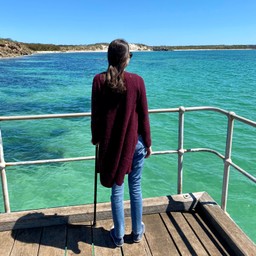Sarcoma is a rare type of cancer. Although only accounting for around one per cent of all cancers, it greatly impacts children and young people, accounting for up to 20 per cent of cancers in children and up to 10 per cent of cancers in young adults.
It is a truly unique form of cancer that can form anywhere in the body. Sarcoma begins in the supporting tissues of the body such as fat, muscle, blood vessels, nerves, bone and cartilage and there are many different types. Often, it is an incredibly long and hard journey to getting better through several cycles of treatment.
Steph was diagnosed with osteosarcoma in 2017, at the age of 30. She was out for a run when she felt a sudden onset of pain in her pelvis that then didn’t go away. Her treatment was 10 weeks of chemotherapy, followed by an eight-hour operation and another eighteen weeks of chemo.
“During this time, I was in a wheelchair for risk of fracturing my pelvis and complicating things further. I began rehab and slowly started to walk again,” Steph said.
“I had a few months where we thought I was free from disease however, I then found a small lump under my arm and scans confirmed I had metastatic disease, which was absolutely devastating.”
The cancer had spread to her lungs, liver, thyroid, soft tissue and other areas of bone. She had palliative radiation for the pain before starting over two years of immunotherapy. Steph responded really well to the immunotherapy and today she is doing well.
Bone Tumour Nurse Practitioner at the SA Sarcoma and Bone Tumour Unit Belinda Fowlie, says that people experiencing treatment for sarcoma can experience a range of physical and emotional challenges.
“The physical impacts of treatment for sarcoma can include pain, disability, the inability to weight bare, reduced range of motion, muscle weakness and weight loss,” Belinda says.
“In addition, treatment can be emotionally draining as well as physically, and there are often feelings of isolation as not many people can understand what they are going through.”
Steph said the physical symptoms are challenging at times as she does still get some pain when walking and being on her feet for long periods of time – she uses a walking stick to take the load off her hip and manage the pain.
“I am very fortunate that the orthopaedic surgeons were able to do the incredible job they did to reconstruct my pelvis,” Steph said.
“I was studying medicine when I was diagnosed, and I was able to return to my studies, which I was so happy about – now I’m a third-year doctor working in radiation oncology and I hope my experience as a patient will make me a better doctor.”
“Before my diagnosis, I was never good at asking for help, but my message to those currently going through cancer is that people really do want to help, all you have to do is ask and let them help you when they offer. It’s often a simple gesture that can make a huge difference and make you feel less alone in your experience.”
“Sarcoma is so rare, and the disease and treatment often leave patients with disabilities which have a big impact on life moving forward, so by publicly sharing my story I hope to be able to help others going through a similar experience.”
It can often be difficult to know where to turn for information and support, especially when you are living with a rare type of cancer, like sarcoma.
If you have recently been diagnosed with sarcoma, or know someone who has, we’re here to help. Our experienced Cancer Council 13 11 20 Nurses are available Monday to Friday, 9.00 am to 5.00 pm.
